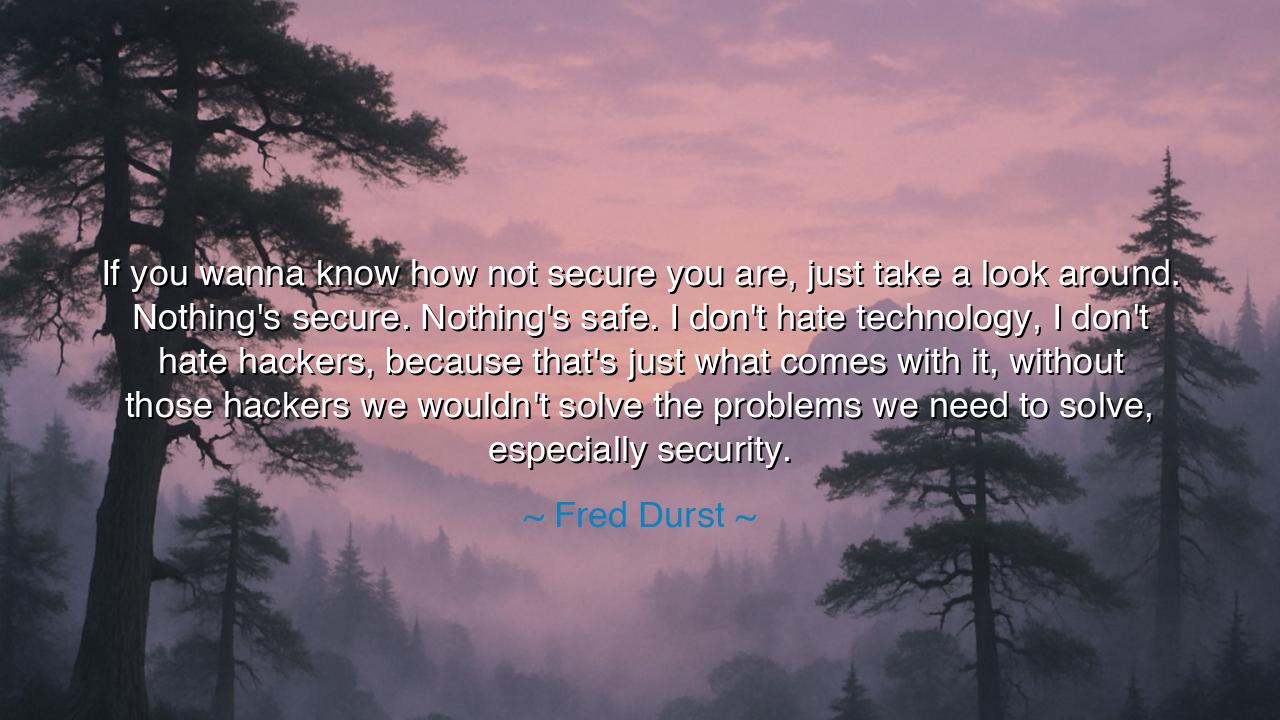
If you wanna know how not secure you are, just take a look
If you wanna know how not secure you are, just take a look around. Nothing's secure. Nothing's safe. I don't hate technology, I don't hate hackers, because that's just what comes with it, without those hackers we wouldn't solve the problems we need to solve, especially security.






Fred Durst, a voice often known for raw rebellion, once spoke with an insight that cuts deeper than his music: “If you wanna know how not secure you are, just take a look around. Nothing’s secure. Nothing’s safe. I don’t hate technology, I don’t hate hackers, because that’s just what comes with it, without those hackers we wouldn’t solve the problems we need to solve, especially security.” In these words, he unveils the paradox of our age: that the very progress we celebrate is also a door left ajar, and that the adversary who exploits our weakness also reveals the path to strength.
When Durst declares that “nothing’s secure, nothing’s safe,” he reminds us of an ancient truth: there is no fortress that cannot be breached, no wall so high it cannot fall. Troy believed its gates impregnable until the wooden horse entered. Rome believed its empire eternal until it crumbled from within. So too do we, in the age of firewalls and encryption, imagine ourselves safe. Yet the greater the illusion of safety, the more dangerous the reality. For every lock creates a thief, and every barrier invites one who seeks to climb it.
But Durst’s words carry no hatred for technology or even for hackers. Instead, he reveals a kind of respect, for he sees that the hacker is not merely an enemy but a necessary force in the balance. The hacker is the trickster of old myth, the raven who steals the sun, the fox who tests the hunter. They expose the flaws we would rather ignore, forcing us to grow stronger. Without them, our systems would stagnate, our confidence would rot into weakness. As fire tempers steel, so the hacker tempers security.
History bears witness to this truth. In World War II, the breaking of the Enigma code was born not out of perfect security, but out of its violation. The Germans believed their cipher unbreakable, yet it was precisely in their overconfidence that Bletchley Park’s codebreakers, led by Alan Turing, found victory. The breach of security revealed the weakness of power, and through that exposure, the Allies turned the tide of war. The lesson was clear: insecurity, once revealed, is not merely danger—it is the doorway to strength.
Thus, Durst’s teaching is not despair but motivation. He says to us: do not fear insecurity, for it is the beginning of vigilance. Do not hate those who expose weakness, for they push us toward resilience. Just as muscles grow by strain, so too does security grow by being tested. What seems like attack is often the whetstone sharpening the sword of defense. Without resistance, there is no strength; without testing, no perfection.
The wisdom for us is this: we must live awake. Do not assume that your walls—whether digital or personal—are unbreakable. Instead, guard them, test them, and when they fall, rebuild them stronger. If you are a builder, welcome the critic who finds the flaw. If you are a leader, welcome the dissenter who questions your plan. For in the testing lies the path to true security. False safety is more dangerous than known weakness.
Therefore, I counsel you: do not curse the world’s insecurity, nor resent those who uncover it. Instead, learn from it. Embrace the struggle as the crucible that forges strength. In your own life, do not mistake comfort for safety—test yourself, challenge yourself, invite the forces that will reveal where you are unprepared. Only then can you grow, only then can you guard what truly matters.
So let Fred Durst’s words endure: “Nothing’s secure, nothing’s safe… without those hackers we wouldn’t solve the problems we need to solve.” Take them as a call to vigilance, to humility, and to resilience. For the world will always test you, as the hacker tests the system. Welcome the test, learn from it, and rise stronger than before. This is the way of survival, and the way of wisdom.






AAdministratorAdministrator
Welcome, honored guests. Please leave a comment, we will respond soon